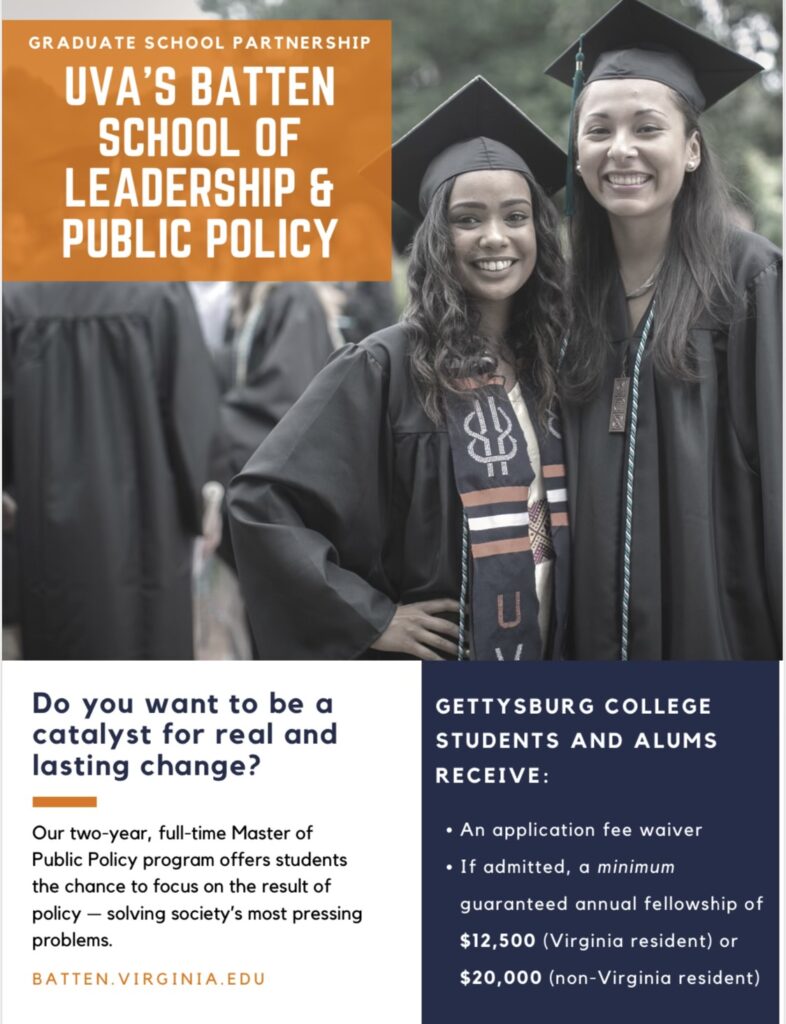Partnership Begins with University of Virginia’s Batten School, Applications for Master’s Program Open Until Mid-January
By Gracie Meisner, Assistant News Editor

Poster advertising UVA’s Batten School of Leadership and Public Policy
Last month, Jeff Chidester, Executive Director of External Affairs at University of Virginia’s highly-ranked Batten School of Leadership and Public Policy, visited Gettysburg College to speak with students about the unique graduate-school benefits available to them through a new partnership between the two institutions.
The University of Virginia Batten School of Leadership and Public Policy’s two-year, full-time Master program offers students who are passionate about being catalysts for real and lasting change the chance to develop the tools to focus on the result of policy—solving society’s most pressing problems.
Their partnership with Gettysburg College offers students and alumni a free application waiver and, if admitted, a minimum guaranteed annual fellowship of $12,500 for Virginia residents and $20,000 for non-Virginia residents.
Chidester explains that the partnership between Gettysburg College and UVA’s Batten School of Leadership and Public Policy is intentional and reflective of the quality of education students receive at Gettysburg.
“The undergraduate experience at Gettysburg College is incredible,” said Chidester. “Our school very much believes in the quality of the people and education at Gettysburg. We believe that Gettysburg graduates could be real contributors to our community.”
Within the graduate program, students complete 49 credits, as well as a summer internship between the first and second year. The core curriculum consists of eleven three-credit core courses: analysis, leadership, foundations and contexts, and experiential.
Chidester explains that building community within the program is a top priority, and that Batten aims to foster an intellectual, innovative, inclusive, and equitable environment. To help fulfill this goal, admitted students attend a two-week summer program prior to beginning their coursework as a way of building cohort camaraderie and developing the framework to start Batten studies on the right foot.
Chidester describes the community at Batten as a tight-knit family—with under 400 (undergraduate and graduate) students in the school, the student-faculty-ratio is low, and faculty are very accessible. A marker of this, Chidester notes, is the fact that Batten students have the opportunity to access money to take their professors out to lunch.
To apply to the program, Chidester explains, three short essays, transcripts, and recommendations are required, but students do not have to take or submit a standardized test in order to ensure equity.
Applications to begin the program in the fall of 2023 are currently open. The round two application deadline is Jan. 20, 2023. Decisions for this round will be released Mar. 6, 2023.
The round three application deadline is Mar. 24, 2023, and students will hear back about their decisions on a rolling basis.
Chidester provides three pieces of advice to potential applicants.
The first piece of advice is to answer essay questions as they are written, because schools design them for specific reasons,” said Chidester.
Next, Chidester said, “The second piece of advice is to get to know the mission of the schools you are applying to, and tell them why you believe in that mission and want to be part of that community. It not only helps you find the best place, but it really resonates with admissions committees.”
Chidester continued, “The third piece of advice is to have fun with the process. It’s kind of like planning for a wedding – you can make it stressful, or really fun. Try to enjoy the process and go where you think is best for you.”
Ultimately, ethical, resilient, solutions-oriented policy leaders are needed more than ever, and Chidester emphasizes the deeply meaningful role Batten can play in empowering students to be catalysts for change.
“We are looking for people to be contributors to our community for a very long time,” said Chidester.
